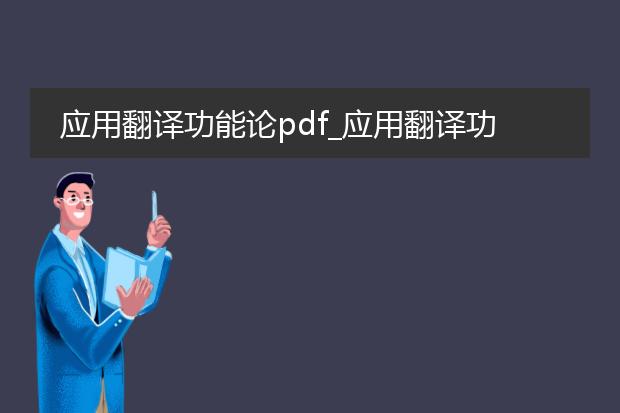2024-12-09 03:15:01

《应用翻译功能论》
在当今全球化的时代,翻译的重要性日益凸显。功能论在应用翻译中占据关键地位。
功能论强调翻译的目的和功能。从目的角度看,应用翻译旨在实现特定的交际目标,如产品说明书的翻译是为了让使用者能正确操作产品。它注重译文在目标文化中的接受度。
功能论下的应用翻译不拘泥于源语形式。例如,广告翻译可能会为了吸引目标受众而采用创意改写。同时,它考虑到不同文本类型的功能差异,像法律文本要求严谨准确,旅游文本则侧重信息传递与文化吸引力。
功能论为应用翻译提供了实用的理论框架,指导译者更好地满足不同领域、不同受众的需求,从而提高翻译质量,促进跨文化交流。
应用翻译课程

《
应用翻译课程:架起语言与实际应用的桥梁》
应用翻译课程在当今全球化背景下具有重要意义。它不同于传统翻译课程,更侧重于将翻译理论与实际应用紧密结合。
在这门课程中,学生接触到各类实用文体的翻译,如商务文件、科技报告、旅游宣传册等。教师不仅传授翻译技巧,还引导学生深入了解不同领域的专业知识。通过案例分析,学生能直观感受不同文化背景下的表达差异,学会如何准确传达原文信息并符合目标语受众的习惯。这门课程为学生开启了通往翻译职业化的大门,无论是从事翻译工作,还是在跨国交流频繁的行业中发展,
应用翻译课程所赋予的知识和技能都是不可或缺的宝贵财富。
应用翻译功能论英文

**title: the functionalist approach to translation**
translation is a complex activity, and the functionalist approach offers valuable insights.
the functionalist theory emphasizes that translation should not be a word - for - word conversion. instead, the function of the target text in the target culture is crucial. for example, in the translation of marketing materials, the primary function is to attract the target audience. translators need to consider the cultural background, values, and language habits of the target readers.
this approach also allows for flexibility. translators may adjust the form of the source text to better achieve the intended function in the target language. they might make adaptations in terms of style, grammar, or even content. in a nutshell, the functionalist view of translation focuses on the purpose of the translation and how it can effectively communicate in the new context.

《
应用翻译理论》
翻译理论在现代社会的翻译实践中有着广泛的应用。
从语义翻译理论来看,它注重源语的语义准确传达。在科技翻译中,精确地传达专业术语的语义至关重要。例如在医学文献翻译时,一个术语的错译可能导致严重后果。
而功能主义翻译理论强调译文的功能与目的。在广告翻译里,为了吸引目标受众,译者会根据目的语文化对广告内容进行灵活调整。如某些国际品牌在中国市场的广告语翻译,会融入中国文化元素,更贴合本土消费者心理。翻译理论的应用有助于提高翻译质量,满足不同领域和文化背景下的翻译需求,促进跨文化交流的有效进行。




